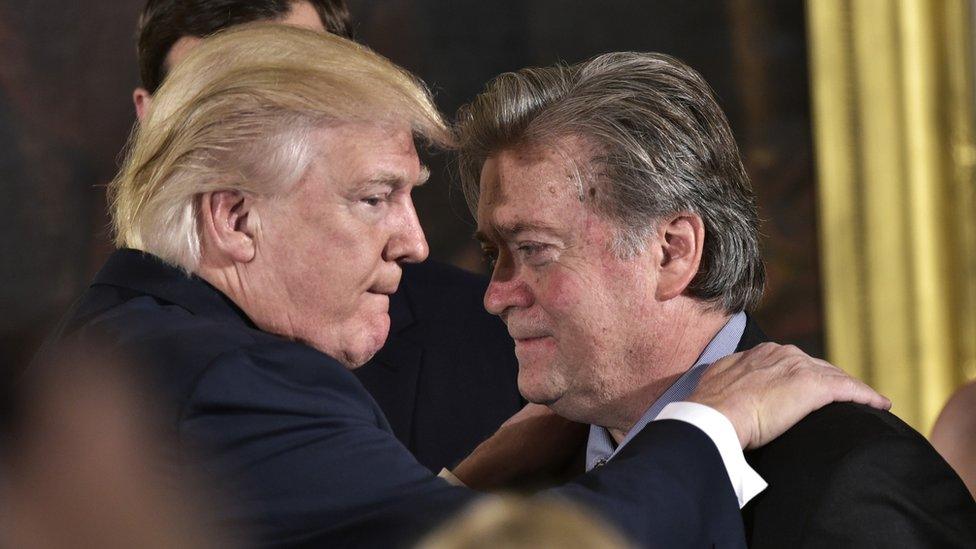US Capitol riot: Steve Bannon goes on trial for contempt of Congress
- Published
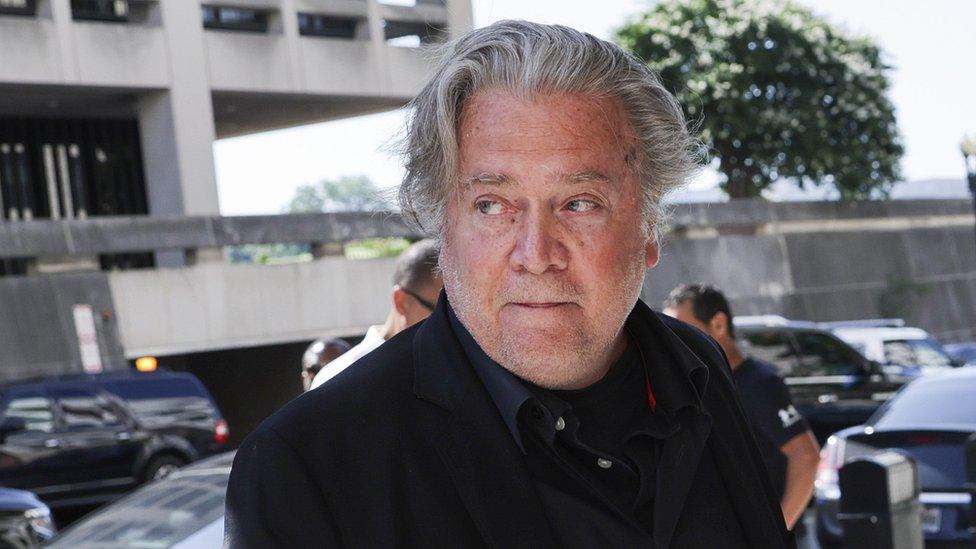
Steve Bannon was at one stage Donald Trump's most senior aide in the White House
Steve Bannon, the former top adviser and campaign chief for Donald Trump, has gone on trial for refusing to co-operate with the congressional committee investigating the attack on the US Capitol.
On Monday, jury selection began in the 68-year-old's trial at a court in Washington DC.
The man once billed as the brains behind Mr Trump's 2016 presidential victory was charged in November with two counts of contempt of Congress.
He had rebuffed subpoenas requesting his testimony as well as relevant documents about his involvement in efforts to challenge Mr Trump's 2020 presidential defeat and organise the protests that culminated in the violent attack on the Capitol on 6 January 2021.
The committee has been particularly interested in Mr Bannon's communications with Mr Trump in the days before the attack, and the "war room" meetings he held at a hotel near the White House with other key figures as part of the last-ditch attempt to block the certification of Joe Biden's victory.
Mr Bannon, in his popular podcast, warned on 5 January that "all hell" was going to break loose the following day.
The committee first subpoenaed Mr Bannon in September 2021. The following month, it voted to hold him in contempt of Congress for his refusal to co-operate, charges the full House of Representatives quickly affirmed in a vote.
At the time, Mr Bannon was defiant, saying: "We're taking down the Biden regime." As the trial date approached, he said on his podcast that his legal strategy would involve "going medieval" on his enemies.
But inside the courtroom, Mr Bannon's bombast has been shelved. The options for his defence have been limited by presiding Judge Carl Nichols, a Donald Trump appointee.
Mr Bannon had sought to claim his contacts with Mr Trump were covered by executive privilege, a legal principle that holds communications between presidents and their advisers are protected from disclosure in order to allow for candid advice.
He also claimed that the congressional committee's subpoenas were invalid because the only Republicans involved were appointed by Democratic Speaker of the House Nancy Pelosi.
Judge Nichols, however, ruled that because Mr Bannon was a private citizen and not a government employee, he could not make executive privilege claims. He ruled that the committee's subpoenas were valid and also rejected Mr Bannon's attempts to call Democratic members of Congress to testify.
Mr Bannon's only remaining defence during the trial may be that the final deadline the committee had set for complying with the subpoenas was not clear.
"What's the point of going to trial if there are no defences?" one of Mr Bannon's lawyers asked Mr Nichols after his ruling. "Agreed," the judge responded.

More on the Capitol riot
BACKGROUND: What happened on 6 January?
HEARINGS: Four things we've learned from Jan 6 hearings
WATCH: How the world saw the riot

Last week, Mr Bannon expressed a willingness to testify to the investigating committee - preferably in an open hearing - after Mr Trump released a letter waiving any executive privilege issues involved in the case. The committee, and the prosecuting justice department lawyers, have questioned the sincerity of the move, however, and said they view the effort as a last-ditch attempt to avoid trial or provide grounds for acquittal.
Because of this case's limited scope, Mr Bannon's trial should conclude in a matter of days.
"It's about whether he got a subpoena, whether he knew about it and whether he showed up when he knew he was supposed to be there," prosecuting attorney Amanda Vaughan said last week.
If convicted, Mr Bannon faces a minimum of 30 days and a maximum of one year in jail and a fine ranging from $100 to $100,000 for each of the two contempt charges. If Mr Bannon loses his case, he is likely to appeal the judge's prior rulings.
'A nation in decline' - how the world saw the Capitol riot
Contempt of Congress cases are a rarity in modern US politics, in part because the circumstances are often politically charged.
The Obama administration declined to follow-up on contempt citations brought against its officials by the Republican-controlled House of Representatives, as did the Republican George W Bush administration when House Democrats took similar actions.
This prosecution has been viewed as a test of the 6 January committee's power to put teeth behind its investigation, even if a successful conviction will do little to compel the former aide to testify or provide the requested documents.
Mr Bannon is one of four former Trump aides to have been cited for contempt by the 6 January committee. One, trade advisor Peter Navarro, has been indicted. The justice department recently announced that it will not bring charges against the other two, former Chief of Staff Mark Meadows and communications chief Dan Scavino, who justice department officials reportedly viewed as having more plausible executive privilege claims.
This is not the first time Mr Bannon has faced the prospect of a criminal conviction. In August 2020, he was charged with wire fraud and money laundering over his involvement in efforts to fundraise money to build a wall on private property along the US-Mexico border. Mr Trump pardoned Mr Bannon for the alleged crimes in one of his final actions as president.
- Published11 July 2022
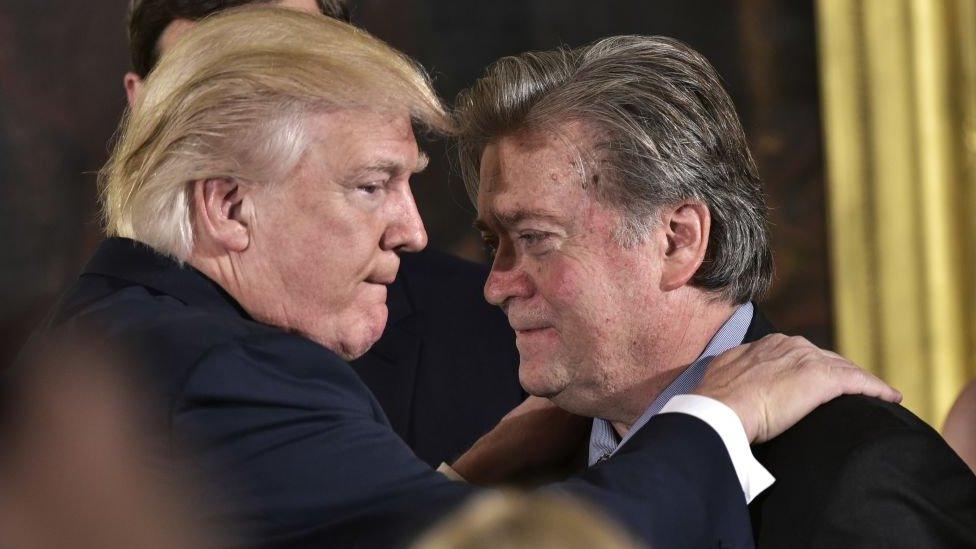
- Published17 November 2021
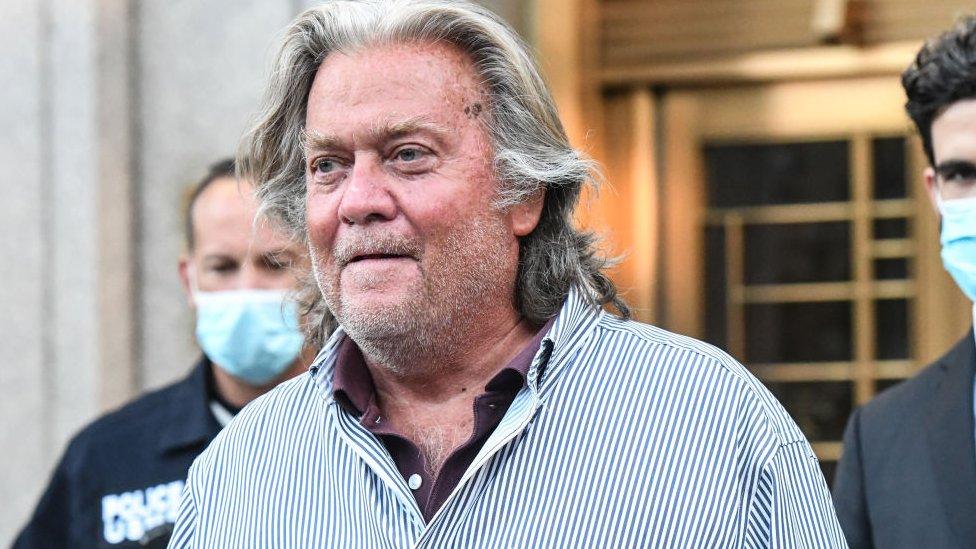
- Published16 November 2021
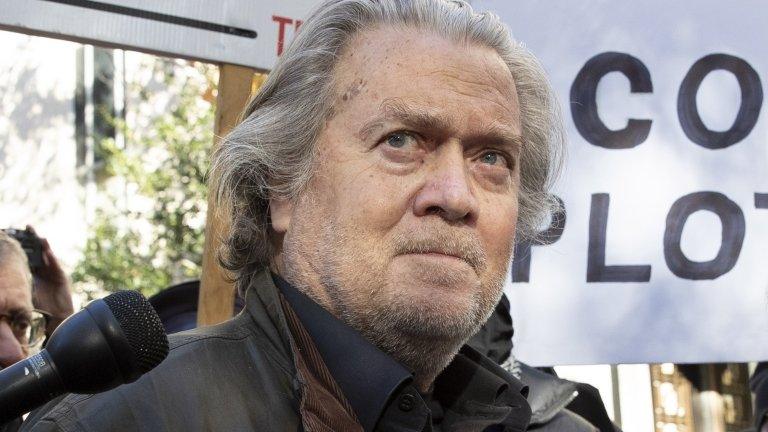
- Published20 October 2021
